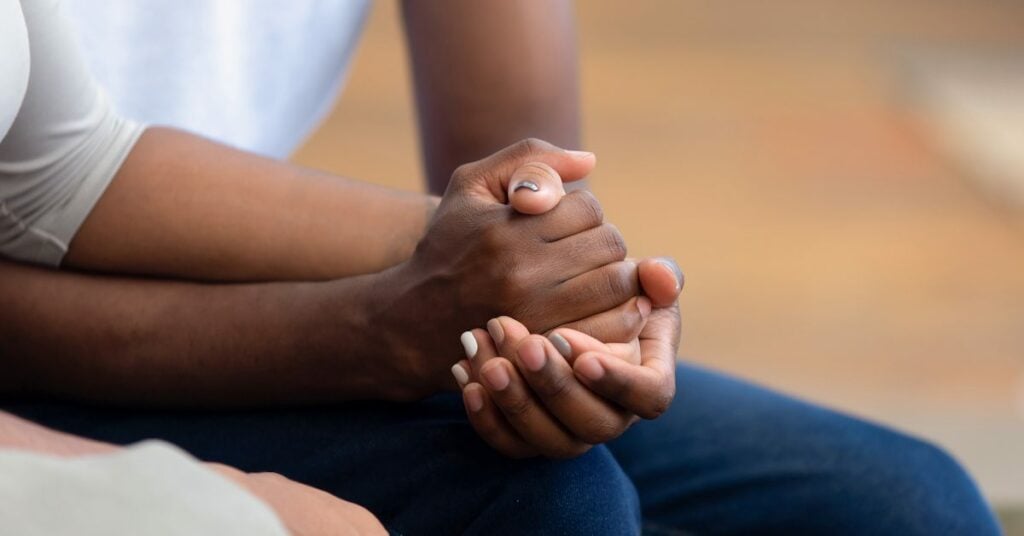How long does grief last?
Reviewed by Stephanie Steinman, PhD, CSAC


Whether it’s for work or the rest of life, I like to make a plan and have a schedule. But no matter how hard we try, certain things just aren’t meant to happen in an orderly fashion. One of those things is grief.


Logically speaking, the loss I suffered shouldn’t have been that devastating. My grandpa Roger was 92 years old when he passed away in 2020. He lived a very long, full life, and for most of that time he was healthy and happy.
But when he passed away, my grief at losing him was compounded by my grief over the COVID-19 pandemic, leading to a spiral that took a long time to pull out of. As I struggled to recover from the loss, I found myself asking the same questions I’m sure many others have. These might sound familiar to you, too.
Shouldn’t I be past this stage of grief by now?
Whenever we lose someone, the stages of grief inevitably come up. Comments like, “It’s okay that you’re angry, it’s a stage you have to go through,” or “Of course it doesn’t feel real, you’re in denial,” seem to crop up left and right from friends, concerned acquaintances, and other mourners.
The concept of the five stages of grief was created in 1969 by Elisabeth Kübler-Ross in her book “On Death and Dying.” Since then, they’ve become a refrain that most people can recite from memory. As Kübler-Ross defines them, these stages are:
- Denial: The reality of the loss has not sunk in, and you struggle to process the magnitude of what’s happened. You may find yourself saying things like “There must be some kind of mistake.”
- Anger: The pain of loss combines with feelings of helplessness, leading to frustration and anger. Anger can serve as an emotional buffer; when you’re feeling angry, it draws focus away from your pain.
- Bargaining: During this stage, you try to ease suffering by striking a deal, often with some higher power. It can also involve ruminating on past experiences with a loved one that can’t be changed. For instance, you may think, “If only I’d insisted they go to the doctor earlier, we might have caught the illness in time to save them.”
- Depression: When the loss becomes real to you, it can feel overwhelming. During the depression stage, you experience the pain of loss acutely and fixate on everything that will now be missing from your life. You may feel helpless, sorrowful, and generally low.
- Acceptance: Acceptance isn’t synonymous with “moving on.” Instead, it means you’ve embraced your new reality. You can begin to imagine the future and what this new version of your life will look like.
Kübler-Ross’s colleague David Kessler, a world-renowned grief expert, introduced a sixth stage of grief in 2019:
- Finding meaning: Kessler defines this stage as the time after a loss in which you can move forward and live in a way that honors your loved one’s memory. You’re able to look back on memories of them with more love and gratitude than pain.
These stages give neat, orderly titles to the messy emotions that pour out after we lose someone. There’s nothing wrong with these titles, and they’ve helped many of us find words for the devastating feelings that follow a loss. The trouble comes when people assume they can process and pass through each stage as if they’re checking it off a list.
Emotions have blurred edges, and healing is nonlinear. There isn’t a straight path from a place of devastation to one where you feel as though the loss never happened. You’ve experienced something that impacts the story of your life, and now you need to figure out how to move forward with this new version of yourself.
Instead of approaching the stages of grief as a checklist, think of them as broad descriptions that can help you understand what you’re going through. You may experience multiple stages at the same time, or think you’ve “gotten through” a stage only to find yourself returning to it. This doesn’t mean you’re doing anything wrong. Grief doesn’t have a road map because everyone processes loss differently.
Give yourself permission to experience your emotions and move through your pain in your own time and your own order. It’s also important to keep in mind that cycling through all of the stages of grief doesn’t mean you’ll never return to them.
Does grief last forever?
When you’re grieving, it can begin to feel like a new permanent reality rather than a painful time of transition.
One popular metaphor used to describe grief is “the ball in the box.” Imagine a box that contains a button. When pressed, this button causes intense feelings of loss and emotional pain. Also inside the box is a ball that rolls around freely, pressing the button and triggering the pain. This ball represents your grief.
When you first lose someone, the ball is large and fills the box, pressing the button almost constantly. Then, over time, the ball shrinks. You’ll begin to find you can go longer and longer without feeling the ball press the button. Even so, the ball is always there—and when it hits its mark, the pain is just as real and may be just as intense as when your grief was new.
Is this another way of saying that grief does, in fact, last forever? In some ways, yes. But it won’t always feel the same.
Your grief may never fade entirely, but its frequency and intensity may lessen over time. One day, you may even be able to look back on memories of your loved one with joy instead of pain.
How can I start to feel better?
Losing someone you love is overwhelming, and it’s hard to know where to begin your journey toward healing. Here are several steps you can take on your own and with help.
- Don’t isolate yourself. Because everyone experiences loss differently, it’s easy to fall into the trap of thinking you’re going through a loss alone. But this is rarely the case. Reaching out to others who knew your person will not only help you both feel less alone, but will also give you an opportunity to share memories and appreciate all the love and good times that came before the loss.
- Find a support group. There are many in-person and online support groups dedicated to those who are grieving. Making time to process your emotions aloud is critical, and hearing others’ stories can also help reinforce the truth that you’re not alone. If you’re already working with a mental health professional to process your loss, they may be able to recommend a group for you.
- Use available resources. If you don’t feel comfortable talking about your loss, there are many other support options. Consider one of the countless books written on different types of loss and the paths that have gotten people through it. With a little research, you can find one related to the kind of loss you’ve experienced.
- Talk to a professional. Grief is a common emotion, despite how solitary it can feel, and therapists are trained to help you process it. Remember that grief can also make other mental health challenges harder. If your grief sticks around or gets worse with time, it’s especially important to look for professional help.
Even now, more than two years after my grandpa’s passing, I still have days where I struggle with thinking about the parts of my life he won’t be around to witness. But most days, I’m grateful for the time we shared and my memories of him.
To love deeply means to open yourself up to the possibility of real pain, including grief. Losing someone may feel impossible at first, but there’s always a path forward.
Help is available now
If you’re experiencing a mental health crisis due to grief or for any other reason, contact one of the following 24/7 helplines:
- 988 Suicide & Crisis Lifeline: 988 or 1-800-273-TALK (8255)
- Crisis Text Line: Text HOME to 741741

About the author
Kirsten Fuchs is the content production manager at therapist.com. She’s excited to be pairing her copywriting expertise and love of written language with the support and clinical insights of the therapist.com team.
Related articles

Grief, bipolar disorder, and a father’s love
Losing a parent is painful for everyone. When you’re also living with bipolar...

Healing from the trauma of gun violence
Gun violence survivors carry the pain of past experience and the risk of...

Healing your relationship after pregnancy loss
When you’re consumed by the grief and trauma associated with pregnancy loss...

Climate change and mental health
Climate change and extreme weather events can create both acute and chronic...
